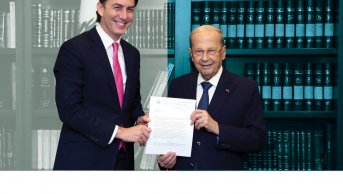The Background of Bashar al-Assad’s Visit to the UAE

On March 18, 2022, Bashar al-Assad paid a visit to the United Arab Emirates (UAE) and held meetings first with Sheikh Muhammad bin Rashid al-Maktoum and then with Muhammad bin Zayed al-Nahyan, Abu Dhabi Crown Prince. While most national and international news outlets regarded this visit as a surprise, it was actually planned four months ago and has been postponed due to Russia’s intervention in Ukraine. As a matter of fact, al-Assad and Muhammad bin Zayed had a phone call on October 20, 2021, and afterwards, November 9, 2021, Abdullah bin Zayed al-Nahyan, the UAE Foreign Minister, visited Damascus with a delegation. Even though no clear information about the details of the visit was provided, it was being guessed that Bashar al-Assad had been invited to the UAE and that such a meeting would take place. Furthermore, it was obvious that this visit was a part of the normalization attempts of the Damascus government.
Looking at the diplomatic developments since the outbreak of the Syrian civil war, one can see that some high -level Arab leaders visited Damascus, yet Bashar al-Assad visited no Arab countries. Therefore, al-Assad’s visit to Abu Dhabi has also been imbued with a symbolic meaning since it has changed a constant situation. The fact that it has taken place despite the USA’s Caesar Syria Civil Protection Act sanctions shows that bolder steps will be taken by the Arab world and Damascus. The Assad regime’s one-sided attempts at normalization will have a new character, and mutual steps toward normalization will accelerate. It is also possible that many Arab countries might want to benefit from the opportunities presented by the prospective restructuring in Syria that is expected to begin soon. The risk of normalization with the Assad regime is less now since the ongoing process tests the efficiency of the sanctions that the Caesar Act brings.
Even though the motives of the Assad regime for its efforts to form diplomatic relations with the UAE are ‘legitimacy, restructuring, normalization, and returning to the Arab League”, Abu Dhabi’s determination to evaluate potential cooperation with the Assad regime despite the United States is a point that deserves further attention. As one of the most important US allies in the Gulf Region, the Emirates seeks to pursue its own independent policies in the Middle East rather than pursuing the US policies in the region. The Gulf countries started searching for new ways since the US failed to provide the expected support against the Gulf countries’ perceived security threats despite its efforts to compensate its military spending through the Gulf countries and also due to the fact that the global focus of the United States shifted from the Middle East to Asia-Pacific and East Africa. Another development that hastened the process for the Gulf countries to adopt policies despite the US is the new opportunities presented to the regional countries by the Russian president, Vladimir Putin, during his visit in March 2019. The UAE welcomed the approach by Russia, which boosted its standing in the region thanks to its military power in Syria. These steps might have paved the way for the inaction of Riyadh and Abu Dhabi against Russia in the Ukraine crisis. Hoping to acquire international support against Russia’s invasion of Ukraine and control the rise in oil prices, President Biden of the US wanted to talk to the Crown Prince of the UAE and yet received no response. One of the most important indicators of the lack of trust in the Gulf Region toward the United States is that it received no reply to its demands, despite the fact that it has been the backbone of the security strategy of the Gulf countries. Russia’s image over the Gulf countries was further boosted since it vaunted its military might in Syria and did not flinch from its intervention in Ukraine despite NATO’s sanctions. Therefore, the Gulf countries started taking action by evaluating the potential for cooperation at global and regional levels in accordance with their national interests. In other words, these developments should be taken into consideration while analyzing the transformation of the UAE’s Syria policies and Damascus’ attempts to convey unity messages on every platform.
These close relations between the UAE and the Damascus administration are undoubtedly followed closely by the USA. The reaction of the US administration to al-Assad’s visit to the Emirates was not different from the reaction given to the UAE Foreign Minister Abdullah bin Zayed Al Nahyan’s visit to Damascus in November 2021, and these reactions did not go beyond expressions of "disappointment". As a matter of fact, US Department of State Spokesperson Ned Price stated, "We are extremely disturbed and saddened by the attempt to legitimize Bashar Assad," and did not mention in his statement that any sanctions within the scope of the Caesar Act will be imposed on states that normalize relations with the regime. This approach by the USA towards the developments in Damascus has not been able to stop the normalization steps of the UAE and has also opened the door to other countries that want to normalize relations with the Assad regime.
While it is extremely valuable for a holistic approach to analyze the efforts to normalize relations between the Emirates and the Damascus regime through diplomatic engagements with the US and Russia, it would be inadequate to ignore the pragmatic approaches of Abu Dhabi and Damascus in the regional context. In fact, when the interests of the UAE are taken into account, it is seen that there are important gains that can be obtained from such a rapprochement. Deriving from its relations with the US, the UAE foresees that it can trust the great powers to a certain extent and it is likely to get a chance to play a role in the formation of a possible new order in the Middle East in the future by developing close relations with Assad, who has largely controlled the civil war. This situation is likely to create an equation in which the UAE will have a say in the political solution processes in the region. The Abu Dhabi administration is aware of the fact that getting closer to Assad in the Middle East means getting closer to the nuclear power Russia, and thereby can have a room for diplomatic maneuvers that can balance the USA. In addition to such diplomatic gains, the UAE seeks to take advantage of the investment opportunities expected to occur in Syria in the near and medium term and aims to bring its deteriorated economic relations with Syria back to the pre-war level.
When we look at the bilateral relations that have developed and normalized through mutual visits in terms of the interests of the regime, it can easily be seen that the Damascus administration is the most willing party in this regard. Syria, a country with more than eighty percent of its population living below the poverty line and whose entire superstructure infrastructure has been destroyed, will seek the opportunity to rise again with the investments of rich Gulf countries such as the UAE. If the other Arab countries follow the UAE in investing in Syria, the Assad regime can avoid, to some extent, being dependent on Russia and Iran for financing the restructuring. In addition, the position of Russia, the most powerful actor in Syria, has come to have an ambiguous character after the Ukraine intervention. Due to the sanctions of NATO countries, the Russian economy may experience a historical collapse, and one of the most negative reflections of this situation is likely to be seen in the Damascus administration. Therefore, in order to minimize this risk, Damascus places more importance on relations with Abu Dhabi than ever before. However, the Assad administration seeks to benefit from its Arab identity through the UAE and wants to balance Iran's influence by breaking the pressure that Iran has put on the regime. The fact that Bashar al-Assad was hosted at the highest level by the UAE authorities had a leverage effect on al-Assad's quest for legitimacy. In fact, it is possible that the UAE's steps to develop high-level diplomatic relations with the Assad regime will be followed by mutual visits with other Arab countries in the Gulf and the region, especially Oman, Bahrain, and Jordan. Eager to return to the Arab world, the Damascus administration has taken a critical step towards this goal with the support of the UAE. However, since Qatar opposes normalization with the Assad regime, the Riyadh and Cairo governments remain silent about the return of the Syrian regime to the Arab League, and the US continues to pose an obstacle, the Damascus administration needs time to return to the Arab League. It can be said that full normalization is not possible unless steps are taken to find a political solution to the civil war.









